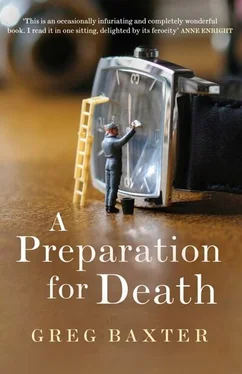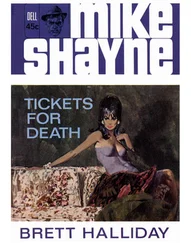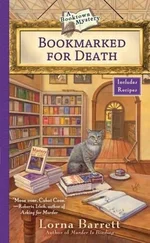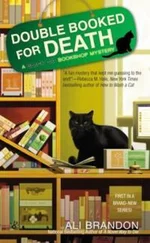Lucy made us tea, and we listened to an interview of her that played recently on ORF. And then some live recordings of her in various venues around the world. She cooked us some salmon and salad, and we ate around her little couch. She has an extremely smooth and deep voice that could put you to sleep if it did not say so many outrageously filthy things. I sat with my back to the window, but opposite a gigantic vanity mirror where she applies make-up and puts on wigs and jewellery, and — for the nights she is to entertain, or stand on stage, or sing, or DJ — transforms herself into a woman of such unquantifiable beauty that heterosexual men buy her nonsensically expensive presents in the hope of sleeping with her. The salmon was simple but full of flavour. I could not believe she cooked anything — there was no empty surface to work on. She seemed to do all her preparation in the air. After a while we took a walk around her garden, which slopes down fifty yards or so. In the spring and summer you can barely walk through it, because it is so overgrown, but in winter you can see the underlying order. Half of her plants are poisonous, and that is precisely the way she thinks of herself. Walter asked her for some gardening tips, since he plans to do some rearranging of his parents’ garden this year.
Slowly we said our goodbyes — we will see her again on Thursday at Motto, where she DJs once a month. Walter seemed a bit more relaxed after our hours of tea, conversation, and walks in the garden. We went home and Walter slept for an hour — his ten days off because of his neck had come to an end, and he had to be in work the next morning. We had dinner reservations at eight-thirty, so Walter and I went to St Peter’s Church for the free twenty-minute organ concert at eight. We sat in the back row. Clare and I had done this when she was here, but in the afternoon. The church was dark, except for orange spotlights shooting through the dome, and candles burning around us. The organist played a fugue by Bach. When we walked out Walter breathed very deeply through his nose. That night, after dinner and a few drinks at the bar up the road, I came home and listened to some Bach that Walter recommended — cello and violin suites. I went to bed and played it on my headphones until I fell asleep.
Walter left for work this morning — it is Monday — and at lunchtime, after the first few hours of work, he sent me a text saying his neck was as bad as it had been ten days ago, and that he was at the doctor’s.
I set out early in a kind of grey rain-snow with my headphones. It has been so many days since I’ve read a book that my German is starting to regress. I don’t watch television apart from the skiing, because Walter likes to watch it — and now seven weeks have gone by since I even glanced at a newspaper. I left Walter sitting in his kitchen smoking cigarettes and drinking tea. His head had once again sunk into his chest, and he had not slept because of the pain.
I took the U4 to Karlsplatz but took the exit to Bösendorferstrasse and bought some CDs at Haus der Musik. After that, I only wanted to walk around some of the empty narrow streets and exorcize language from my appreciation of Bach, to continue to rearrange the way my brain studied music. This was impossible. Thoughts came raining out of the back of my brain. I wished I could reach in through my mouth and extract them. When I leave, and there is only the permanent self of my past in Vienna, I would like to think that he, that self, may exist in a condition of sound and sight alone, a figure in gloomy weather, sunshine, night, and snow.
I hiked up to Schloss Belvedere, first around the grounds that face Upper Belvedere. There were only three other people there, and they were taking photos of each other taking photos of each other with three different cameras. I walked around the large, empty fountain, then down through the gardens toward Lower Belvedere. The gardens are being revitalized, according to small displays staged all around the paths as a sort of apology. There was nobody around but some Asian tourists and a few construction workers smoking cigarettes around bits of dug-up earth. Beyond Lower Belvedere, Stephansdom was looming hazily above the centre of the city — and somehow with the sight was the implication of all my comings and goings there, and my dispensability. But these words come now; when I saw the tower flashing in and out of the blowing-sideways haze, I merely felt like I had seen what I had come to see. My Bach ran out, and I felt it would ruin the experience to play it again.
And now I am sitting in Kleines Café beside a beautiful Taiwanese woman and an ugly, short American man. It is impossible not to eavesdrop, because they are speaking in English — I have surmised that she is a professional concert violinist and he is a struggling, broke, untalented violinist. She is about to start a tour of Asia, and he tells her he is getting old and has no accomplishments. What’s an accomplishment? she asks. Something you do that you can make a career out of, he says. I have been here for an hour and he has done nothing but complain. He has a voice that is just one octave away from crying. The waitress brings him a Melange — in Kleines Café the Melange comes with a large amount of whipped milk on top — and he says, like a little child who has lost his toy, in a German that is brutally Americanized in accent, But I ordered my Melange without whipped cream. (Aburr ick habbuh meinuh muhlonj ohne schlawg buhshtellt.) She says, irascibly, that it’s not whipped cream, but milk — that’s the way it is served. Okay, he sighs — that sigh could have killed a thousand sunflowers on a hillside. And then he tells the Taiwanese girl that he needs to reduce his fat intake, and milk has a lot of fat. Send it back, the girl says. No, he says. Never mind. Sighing again. He says he has trouble with women because he respects them too much. It is good to respect women, she says. He tells her he does not have the patience to practise music and study it at the same time. She says it is necessary, if one is to become a musician. He is bald but lets his hair grow out at the sides and back, and a little patch at the top. She has long black hair and wears a white jumper. She is the most beautiful girl I have seen in days. She moves her empty espresso cup around impatiently. The complaints go on and on. His posture is hunched and ashamed. Today, he says, all he could do was clean the floor of his apartment, which is small, and which he hates. Well, she says — and what is she supposed to say? — cleaning your apartment can be therapeutic. He shrugs. There is a girl he likes, but she doesn’t like to meet on weekdays, only on weekends, and she gets too drunk. You should teach her how to enjoy weekdays, she says. No, no, I can’t. I don’t want to change anyone. If I love someone, I must respect her decisions. I want to haul him up by his collar and toss him through the window. To have this beautiful woman in front of him and despair. To complain away the hour. To blame women for his shame — to blame respect for his distaste of them. Perhaps he thinks she will take pity on him, love him for the sweetness he wears to conceal his identity, the envying, hating, self-pitying man whose only sincere realization is that he wants more than he can have. And he has turned this into a philosophy. The things he said! About reading that having positive thoughts led to success, except that he could have no positive thoughts. The fact that his bow was responsible for the sick sounds that came out of his violin. You should buy a new bow, she says. But I have no money, he says. No wonder you won’t make a musician, I want to say. I want to break my chair over his back, throw him through the window and strangle him in the street. And then take his place opposite the violinist and say, Let’s start over.
Читать дальше












